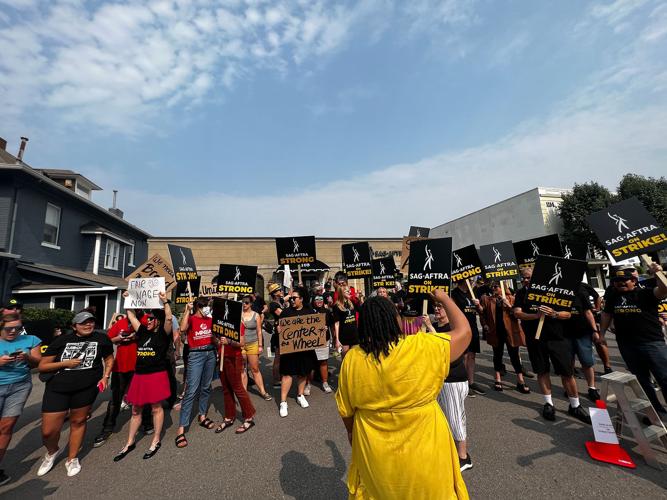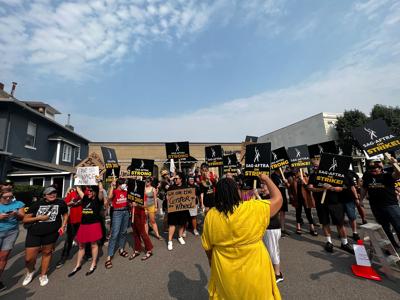Ted Welch, a Hendersonville native, has appeared in shows like True Blood and films including The Help. Last year, he worked on Martin Scorsese’s Killers of the Flower Moon, which will be released in October, as well as the TV shows Women of the Movement and Manhunt.
But despite those credits, he still didn’t earn enough payment to qualify for the actors union health insurance last year — he was $1,000 short of the required $26,470 income, he tells the Scene. His case isn’t unique, according to a local leader of the Screen Actors Guild-American Federation of Television and Radio Artists, the union representing actors best known as SAG-AFTRA.
“Unfortunately, approximately 87 percent of our membership is not making their benefits,” says Carla Christina Contreras, vice president of the Nashville chapter of SAG-AFTRA.
While the frontline of the actors and writers strikes is in Hollywood, Nashvillians are also feeling the impact of the work stoppage and studios’ refusal to negotiate on key points. Contreras says there are approximately 1,605 members in Nashville’s SAG chapter, which also includes recording artists.
Contreras, who is part of the national SAG-AFTRA negotiating committee, identifies four major demands: higher residuals from streaming services; improved self-taped audition practices; higher minimum payments while shooting; and regulations on the use of artificial intelligence.
Welch says residuals used to pay well when broadcast was the dominant model, but over his 13 years as a SAG-AFTRA member the payouts have dwindled, especially with streaming services paying lower amounts after longer waits.

Carla Christina Contreras at a SAG-AFTRA rally in Nashville
“You’d do an episode of Grey’s Anatomy and you’d get like $500 to $1,000 like every four months,” says Welch. But his residuals for appearing on four episodes of 2022’s Women of the Movement on ABC was just $97 — “which is the biggest residual I’ve gotten in a hot minute.”
Contreras also describes the arduous practice of actors taping their own auditions to send into casting calls. The equipment needed for a professional recording can cost hundreds of dollars, and the process is time-consuming. Audition calls often arrive on Friday with self-tapes due Monday, meaning the weekend is lost to work. And if they get the part, actors may need to cover their own travel expenses.
The use of artificial intelligence has been a contentious issue for writers and actors alike. One particularly notable concern is that some studios want to acquire the likeness rights of background actors to replace them with digital copies.
SAG-AFTRA member Dean Shortland isn’t a fan of AI in films — stressing it can’t replace the “real heartbeats” actors bring to meaningful stories — but thinks that if the technology won’t go away, then there “has to be better guidelines to protect our futures as entertainers.”
Non-SAG actors share the same frustrations about payments and self-taping. Randa Newman, Dajanae Cole and Ali Alsaleh, the co-founders of Typecast Pictures, express support for the strike and don’t plan on acting until it’s settled. Alsaleh had a role in the Disney+ superhero show Ms. Marvel and had to wait one year for a $1,200 residual payment — that’s before taxes and giving a percentage to his rep.
Cole, who appeared in Netflix’s They Cloned Tyrone, wants people to understand that many actors are underpaid workers — not everyone is an A-lister. “It looks glamorous, but that doesn’t mean you’re getting paid enough,” she says.
“The bookings are, if you’re lucky, maybe once a month,” says Newman. “It’s just not sustainable.”
The strike doesn’t apply to all productions, only movies and shows affiliated with the Alliance of Motion Picture and Television Producers, a bargaining unit that represents Disney, Paramount and other huge studios. Actors can still perform in plays, commercials, video games and more.

A SAG-AFTRA rally in Nashville
Indie films can also qualify for an interim agreement with SAG. While some movie fans may hope that means a rise in independent cinema during the strike, not all actors are fans of the exception.
Welch was working on the independent film Bob Trevino Likes It when the strike was called on July 13, and the production managed to get permission to continue filming after a brief halt. As excited as he is about the movie, Welch says he’s not sure he’d take part in another interim agreement. He instead plans to focus on the construction company he owns until the strike is over.
Although Tennessee is not a union-friendly state, the strike doesn’t mean nonunion productions will flock here — incentives still play a big role in where productions choose to film.
Tennessee launched a new incentive program in 2022 that attracted big productions like Nicole Kidman’s Holland, Michigan via tax credits. Bob Raines, chair of the Tennessee Entertainment Commission, says those types of projects have paused this year — at that size, they’re usually union.
Raines says those productions could have meant $150 to $200 million spent locally, from payroll for Tennesseans working on set to the costs of equipment rentals.
The entertainment industry, including the larger music scene, also brings in a lot of tax dollars for the state: In 2022 it generated $365 million in taxes. “It’s a significant industry,” says Raines.








